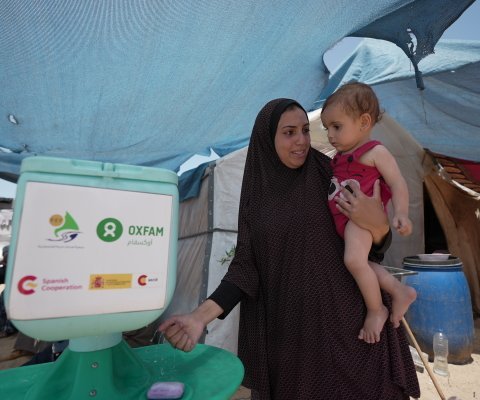WASHINGTON — On the eve of his trip to Africa, international humanitarian agency Oxfam called on President Bush to make a new commitment to prioritize development on the continent.
President and Mrs. Bush will travel to Benin, Tanzania, Rwanda, Ghana, and Liberia from February 15-21, 2008. According to the White House, the trip is likely to be focused on the fight against HIV/AIDS, democratic reform, free trade and economic opportunity across the continent.
“A victory lap around Africa is a bit premature,” said Raymond C. Offenheiser, president of Oxfam America. “President Bush has made strides to increase and restructure overseas assistance, but much greater reform of US foreign aid across the world is needed to ensure that the long-term needs of the poor—not politics—come first. At a time when the US is giving more money to Africa than ever before, our aid looks less strategic than ever.”
American generosity is undermined by a scattershot approach that prioritizes reactive efforts—like food aid—that save lives, but don't address underlying causes of poverty and hunger, according to Oxfam. US aid money should be used to strengthen economic systems that address the rights of those living in poverty, promote small producers and rural communities and strengthen national and local governments, civil society groups, and basic infrastructure in poor countries.
In addition, a growing portion of US aid prioritizes short-term security goals at the expense of long-term poverty reduction. Currently, the US Agency for International Development – which has traditionally led US foreign assistance efforts – administers less than half of US foreign aid while the share administered by the Department of Defense has jumped from 3.5 percent in 1998 to 18 percent in 2006.
“When aid is used to fight poverty effectively, it builds a safer world for everyone, and strengthens US international standing,” said Offenheiser. “Using aid for short-term security purposes – for force protection, troop morale, popular support, and other activities which do little or nothing to help reduce poverty –is unlikely to have a lasting impact on either long-term security or poverty.”
Oxfam also welcomed President Bush's recently stated commitment to finalizing a new global trade deal, but noted that the American negotiating position has not changed. The US has been aggressive in seeking greater access to developing country markets, but has been reluctant to reduce agriculture subsidies that risk increasing poverty in many developing countries.
“Pro-development trade reform at the multilateral level is badly needed, but an agreement at the WTO that would serve poor countries’ interests still seems a long way off,” said Offenheiser.” A deal that helps reduce poverty will only be achieved if rich countries change their attitudes and put development at the center of their concerns.”
In Benin, a poor cotton producing country, President Bush will undoubtedly have to defend the US’s just announced appeal to a recent World Trade Organization ruling that confirmed, yet again, that American cotton subsidies are trade distorting and that the US has not done enough to reform them. This comes as the US Congress is finalizing a bloated and broken Farm Bill that turned US farm legislation from bad to worse. But, with pressure applied by the Bush Administration to force further changes in the Farm Bill, Oxfam hopes that Congress will make some necessary reforms, such as payment limits, before sending the bill to the President to sign it into law.
“We have appreciated President Bush’s commitment to some long overdue reforms of commodity programs in the Farm Bill,” said Offenheiser. “It’s not too late to bring about more reform and create a better bill in conference.”


